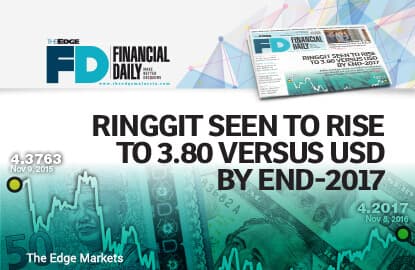
KUALA LUMPUR: RHB Research chief economist Lim Chee Sing said the ringgit should stabilise at around 3.80 against the US dollar by end-2017, as the headwinds Malaysia faces — especially the perceived political instability — gradually dissipate.
Lim said the weakening of the ringgit had been partly driven by worries about political instability, following the fiasco surrounding 1Malaysia Development Bhd (1MDB), as well as a general weakening of the country’s economic fundamentals.
“The ringgit is actually undervalued due to the significant risk premium built into it. A lot has to do with the perceived risk of political instability following the 1MDB issues.
“But obviously, the weakening of the ringgit over time is not just due to political reasons, as a strengthening US dollar and the weakening economic fundamentals of the country are also factors,” he said at a press conference at Deloitte Malaysia’s TaxMax seminar yesterday.
However, he said the political risk premium accorded to the ringgit should narrow over time as the political landscape becomes clearer.
“The fear of political instability, I think, is overblown. The headwinds should dissipate and the risk premium would gradually narrow and that should allow the ringgit to strengthen to the 3.80 level against the US dollar, perhaps towards end-2017,” he said.
Meanwhile, he noted that other factors such as the subdued global crude oil prices had given rise to fears that the government would not be able to meet its fiscal deficit target.
In the recently announced Budget 2017, the government maintained its fiscal deficit target of 3% of gross domestic product for 2017, 0.1% lower than 2016’s target of 3.1%.
Lim said the Chinese government’s move to weaken the yuan last year — in a bid to stimulate its slowing economy — had also raised concerns regarding the impact of the weaker currency on the currencies of commodity-dependent and
developing economies.
To recap, the ringgit began its descent in the latter half of 2014, after global crude oil prices plunged amid concerns over an oversupply, ending 2015 at around 3.50 against the US dollar, versus levels of around 3.20 seen in the earlier part of 2014.
At the time of writing, the ringgit was traded at 4.2005 against the greenback.
Lim also offered his personal view on the impact of the US presidential election on the US dollar, saying that a victory by Republican party candidate Donald Trump would result in a strengthening of the greenback.
“Trump is very US-centric — isolation of trade; his foreign policy are all US-centric. If the people vote for him as president, they are voting for change. This signals change for the US economy.
“His uncertain policies will create a lot of concern for people outside the US, but with the [US] dollar being a safe-haven currency, the uncertainty will instead strengthen the [US] dollar,” he opined.
On the other hand, a victory by the Democratic party’s Hilary Clinton would see the greenback trading sideways, as existing policies are continued.
“If Hilary Clinton is elected, it will be a continuation of Barack Obama’s policies. This will remove some uncertainty. I think the [US] dollar would trade sideways in that scenario,” added Lim.